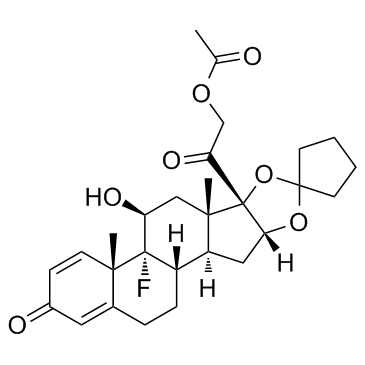Trypsin inhibitors inhibit induction by interferon-gamma of HLA-DR antigen expression on human skin cells.
B Berman, B Smith
Index: Exp. Cell Res. 183(1) , 215-28, (1989)
Full Text: HTML
Abstract
Serine protease inhibitors with a specificity for trypsin inhibit interferon-gamma (INF-gamma)-induced HLA-DR expression on a hybrid human epidermal cell line (H12), dermal fibroblasts, and primary keratinocytes. Protease inhibitors with a specificity for chymotrypsin or papain fail to inhibit IFN-gamma. The inhibitory effect of the trypsin inhibitors is similar to that of glucocorticoids in that it is a transient event, fading with length of exposure to IFN-gamma, and is reversed by the addition of dibutyryl cyclic AMP (dbcAMP) and phospholipase C(PLC) from Clostridium perfringens. In H12 cells, dbcAMP and PLC enhance the IFN-gamma induction of HLA-DR, but do not induce in the absence of INF-gamma. Evidence suggests that the protease inhibitors, as well as dbcAMP and PLC, may modulate HLA-DR expression at a post-translational site as well as during IFN-gamma signal transduction. These results suggest that trypsin-like protease activity may be required for cellular HLA-DR antigen expression following exposure to IFN-gamma.
Related Compounds
| Structure | Name/CAS No. | Molecular Formula | Articles |
|---|---|---|---|
 |
Amcinonide
CAS:51022-69-6 |
C28H35FO7 |
|
Contact allergy to amcinonide.
1986-08-01 [Contact Dermatitis 15(2) , 109-11, (1986)] |
|
Selective corticosteroid injection into the extensor pollici...
2002-01-01 [Orthopedics 25(1) , 68-70, (2002)] |
|
Perioral dermatitis secondary to the use of a corticosteroid...
1987-12-01 [Int. J. Dermatol. 26(10) , 649, (1987)] |
|
Comparison of amcinonide ointment 0.1 percent twice daily an...
1983-05-01 [Cutis. 31(5) , 566-9, (1983)] |
|
Identification and characterization of triamcinolone acetoni...
2012-12-01 [Immunopharmacol. Immunotoxicol. 34(6) , 912-8, (2012)] |